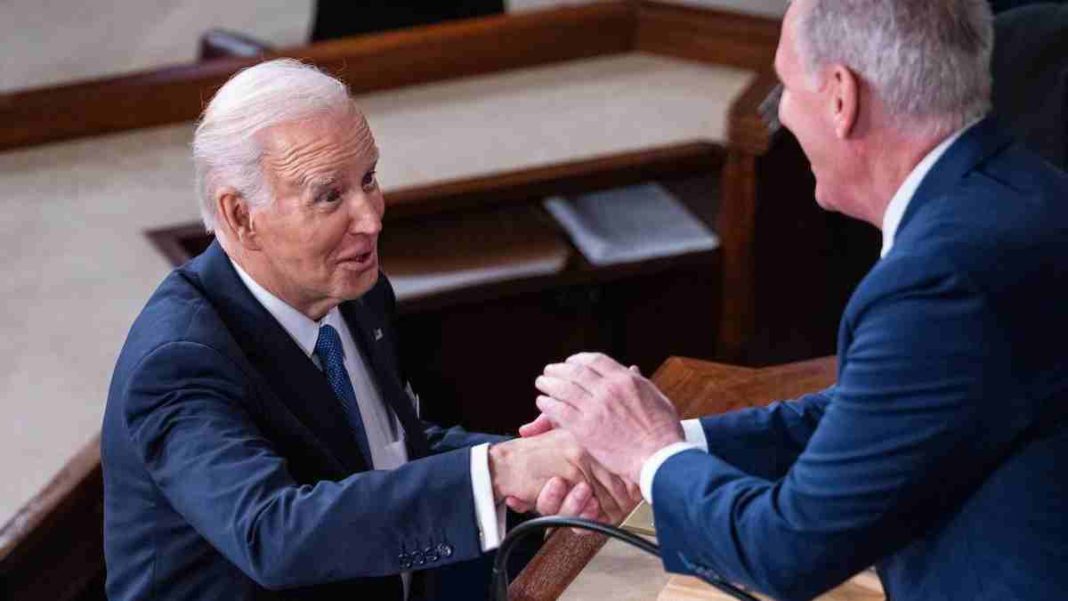UNITED STATES: A divided U.S. House of Representatives passed a bill on Wednesday suspending the $31.4 trillion debt ceiling with support from the majority of Democrats and Republicans in order to overcome opposition from hardline conservatives and evade a catastrophic default.
By a vote of 314 to 117, the Republican-controlled House approved sending the bill to the Senate, which now has until Monday to pass it and deliver it to President Joe Biden before the federal government runs out of money to pay its debts.
After the vote, Biden said, “This agreement is good news for the American people and the American economy. I urge the Senate to pass it as soon as possible so I can sign it into law.”
71 adamant Republicans opposed the measure, which was a compromise between Biden and House Speaker Kevin McCarthy. Normally, that would be enough to prevent partisan legislation from passing, but 165 Democrats supported the bill, which was passed over the objections of 149 Republicans.
Republicans are in charge of the House by a slim margin of 222-213.
The law suspends—or, to put it another way, temporarily removes—the borrowing limit for the federal government through January 1, 2025. The timeline enables Biden and Congress to defer the politically precarious matter until after the November 2024 presidential election.
In addition, it would restrict some government expenditure over the following two years, expedite the approval procedure for specific energy projects, recover wasted COVID-19 funding, and extend the job requirements for food aid programmes to include more recipients.
Hardline Republicans have demanded greater spending cuts and stricter reforms.
Representative Chip Roy, a prominent member of the hardline House Freedom Caucus, said, “At best, we have a two-year spending freeze that’s full of loopholes and gimmicks.”
Progressive Democrats, who had opposed negotiations over the debt ceiling along with Biden, are opposed to the plan for a number of reasons, including the addition of additional work requirements for some federal anti-poverty programmes.
“Republicans are forcing us to decide which vulnerable Americans get to eat, or they’ll throw us into default. It’s just plain wrong,” Jim McGovern, a Democrat, said on Wednesday.
Late Tuesday, the nonpartisan Congressional Budget Office estimated that the law will save $1.5 trillion over ten years. That is less than the $4.8 trillion in savings that Republicans sought to achieve in a plan they got through the House in April, and it is also less than the $3 trillion in deficit reduction that Vice President Biden’s proposed budget would have achieved over that period through new taxes.
Senate up next
Both party leaders in the Senate expressed the expectation that the bill would be passed before the weekend. However, a potential hiccup with amendment votes would make things more difficult.
Republicans stated that in order to secure swift action, Senate Minority Leader Mitch McConnell and Senate Majority Leader Chuck Schumer may need to permit votes on Republican amendments.
On Wednesday, though, Schumer gave the impression that amendments were not possible when he told reporters: “We cannot send anything back to the House, plain and simple. We must avoid default.”
If any of the 100 senators tries to stall passage, Senate discussion and vote might go into the weekend.
Hardline Republican Senator Rand Paul, who has a history of postponing crucial Senate votes, has declared that if given the opportunity to propose an amendment for a floor vote, he would not do so. Senator Bernie Sanders, a liberal independent who joins the Democratic caucus, declared he would reject the bill because it calls for more work and includes an energy pipeline.
On Twitter, Sanders stated that “I cannot, in good conscience, vote for the debt ceiling deal.” Republicans would benefit from the bill’s financial shift away from the Internal Revenue Service, but the White House insists that tax enforcement should not be compromised.
The pact mostly preserves his landmark infrastructure and renewable energy programmes, and the expenditure reductions and work requirements are significantly less than what Republicans had demanded.
The national debt, which currently stands at $31.4 trillion and is almost equivalent to the economy’s yearly production, has been the subject of Republican arguments that drastic spending reductions are required to stop its development.
Government projections indicate that interest payments on that debt will consume a greater portion of the budget as an ageing population drives up health and retirement costs. The agreement wouldn’t do much to slow down those rapidly expanding programmes.
The majority of the savings would result from limiting spending on domestic initiatives, including housing, education, research, and other categories of “discretionary” spending. Over the following two years, military spending would be permitted to rise.
The debt-ceiling impasse led rating agencies to issue a warning that they would downgrade US debt, which supports the global financial system.
Last week, credit rating firm DBRS Morningstar put the United States under scrutiny for a potential downgrade, echoing similar cautions from Fitch, Moody’s, and Scope Ratings.
In 2011, another agency, S&P Global, downgraded U.S. debt in response to a debt ceiling dispute, during a time of ideological conflict with a Democratic president, a majority in the Senate, and a Republican-majority House.
Also Read: Debt Ceiling Deal Faces Opposition from Hard-Right Republicans, Challenges ahead for Biden



